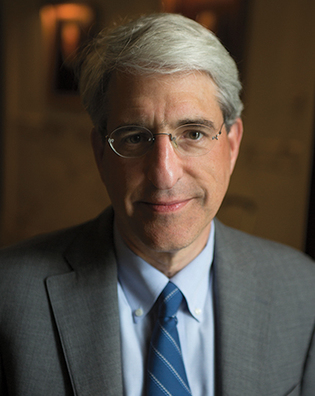 loading
loading
Q&A: Peter SaloveyPublic policy and the social sciencesYale emphasizes a data-driven approach. The Yale Alumni Magazine regularly holds a conversation with Yale president Peter Salovey ’86PhD to provide a forum in which alumni can learn his views. (Interviews are conducted both in person and by e-mail and condensed for print.)  Mark OstowIn this issue, Salovey talks about plans for the social sciences. View full imageYale Alumni Magazine: The science strategy report is out, and you have plans for social science. Peter Salovey: Yes, the University Science Strategy Committee report was released in June, and we have already received thoughtful input from faculty, staff, students, and alumni. As we consider the committee’s recommendations and plan for implementation, I am looking forward to receiving more suggestions from the community. As many alumni know, Yale is advancing faculty and educational excellence—focusing on supporting our faculty and students in addressing some of the most significant scientific, technological, and societal challenges of the day. To do this, we are bridging the boundaries among fields in the humanities by creating a central home where the old Hall of Graduate Studies was located; connecting our arts programs with other parts of the university; and bolstering select areas of science and engineering to further preeminence. In the social sciences, we are emphasizing the importance of using empirical approaches and data-driven research to tackle global issues, such as crime, extremism, health care, inequality, and migration. Right now, in the information age, social scientists have unprecedented access to data. By developing tools to analyze the data available, we can inform public policy issues by providing facts, not intuitions or anecdotes. Yale’s faculty members ask questions, not from an ideological or partisan point of view, but from the perspective of investigation: they are interested in analyzing data to shed light and contribute knowledge. It is important to note that this data-driven focus on social science will in no way replace theoretical work or descriptive work, or research that involves the collection of qualitative data. What we want to do is add an approach that complements our strengths, while also providing a commonality across the social science programs at Yale—a shared mission—and taking advantage of the kinds of data available now. Y: Is any new work taking shape yet? S: Yes, new work is taking shape. The Tobin Center for Economic Policy, announced in June, will connect economics and political science, and complement existing strengths in both fields. Economics at Yale is already largely data driven, so the new center provides a more applied focus on policy issues to a department that is strong in most other areas. For the Department of Political Science, which is already quite involved in domestic and international policy issues, the center provides additional methods for incorporating data collection to research and teaching. We expect that faculty members from other schools and departments will also affiliate with the new center. Our statistics department is especially interested in the new troves of data. It has redefined itself as the Department of Statistics and Data Science. Faculty are looking at innovative ways to handle massive datasets in collaboration with political scientists, economists, psychologists, biologists, medical practitioners, and others. For example, John Lafferty, one of the new faculty members in the department, is working with colleagues in psychology; molecular, cellular, and developmental biology; and mathematics to explore synergies between data science and neuroscience. We also have a dynamic group of statisticians in other schools and departments—public health, for example—who want to work on emerging data science challenges. In addition, some of our faculty members are already conducting empirical and policy-relevant social science research. Yale’s focus on data-driven social science will increase the connections between the Faculty of Arts and Sciences and other parts of Yale, including the School of Forestry and Environmental Studies, the School of Public Health, the School of Management, the School of Medicine, the School of Nursing, and the Law School. Y: Partisan politics can often overlook data. S: Yes, politicians and other leaders can underestimate the value of research. But there are notable exceptions. When Brown v. Board of Education was decided, the Supreme Court was swayed by Kenneth and Mamie Clark’s research showing that the majority of the black children who participated in their studies preferred white dolls over black dolls. Social science research may not solve every social policy question, but it provides an alternative to partisan bickering. I am agnostic about which public policy topics our investigators address—the faculty will make their own choices. What is important is that our faculty members and students are using the most rigorous analyses of data and the strongest conceptual thinking about global challenges. I believe this emphasis on data will also help the many Yale students who are interested in pursuing careers in finance, politics, government service, or the nonprofit sector. Our students can learn that rigorous analysis and careful thought are invaluable to pursuing their passions and making a difference in the world.
The comment period has expired.
|
|